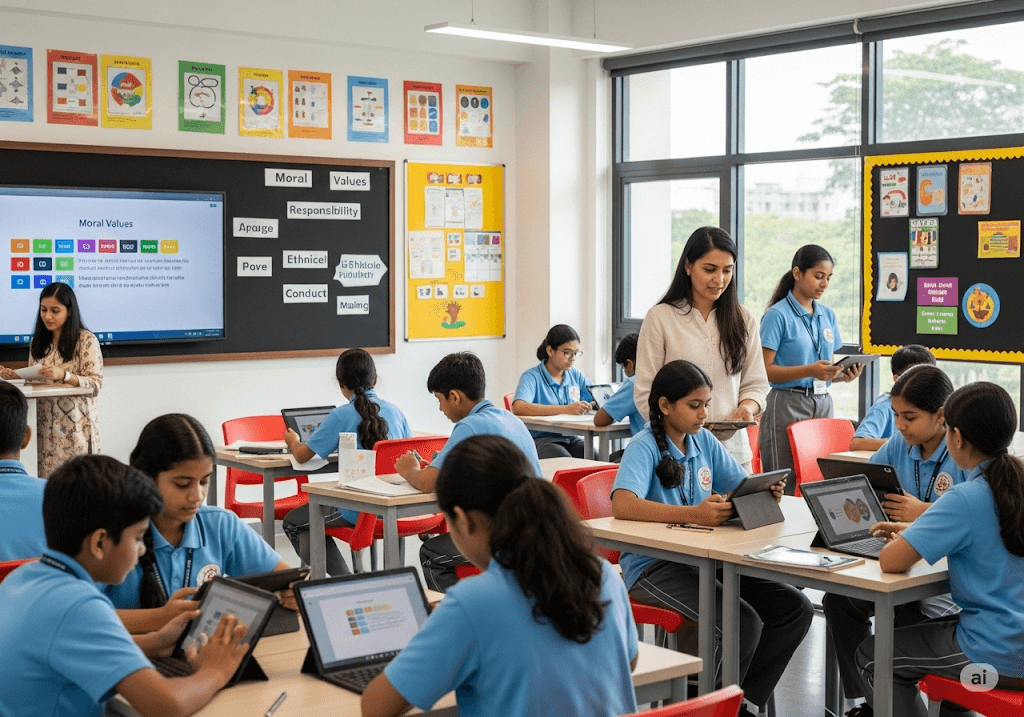21st Century Learning with a Moral Core: Value-Based Education in India’s Top CBSE Schools
In a fast-paced world driven by technology and competition, academic success alone isn’t enough to prepare students for life. India’s best CBSE schools are redefining education by weaving value-based education into their curricula, nurturing students who are not only skilled but also empathetic and principled. At institutions like Sri Sri Ravishankar Vidya Mandir (SSRVM), this approach ensures young minds grow into responsible global citizens.
Here are 12 key insights into how value-based education is transforming learning in the best schools in India, blending modern pedagogy with timeless Indian values.
1. Defining Value-Based Education
Value-based education integrates ethical principles like honesty, compassion, and respect into academic learning. It aims to develop students who make decisions rooted in morality, contributing positively to society. At SSRVM, this philosophy aligns with holistic development, fostering both intellectual and emotional growth.
2. Why Values Matter in 21st-Century Education
In an era of rapid change, values provide a moral compass for navigating complex challenges. Schools prioritizing value-based education equip students to handle ethical dilemmas in personal and professional spheres. This approach ensures graduates from the best CBSE schools in India are not just career-ready but life-ready.
3. The Role of Educators in Instilling Values
Teachers are the torchbearers of value-based learning. By modeling integrity and empathy, they create a classroom culture where values thrive.
Practical Tip: Use real-life scenarios in lessons to discuss ethical choices.
SSRVM Example: Teachers at SSRVM incorporate storytelling from Indian scriptures to spark discussions on moral courage.
4. Management’s Role in Shaping a Value-Driven Culture
School leadership sets the tone for embedding values across the institution. By prioritizing ethical policies and community engagement, management ensures values are lived, not just taught. SSRVM’s leadership, for instance, fosters a culture of mindfulness through yoga and meditation programs.
5. Blending Technology with Traditional Values
Modern tools like AI and virtual classrooms can reinforce values when used thoughtfully. Digital platforms can teach collaboration and empathy through group projects or global cultural exchanges. The best schools in India leverage tech to make value-based lessons interactive and relatable.
6. Classroom Strategies for Value-Based Learning
Practical activities make values tangible for students. Here are some strategies:
Role-Playing: Simulate ethical dilemmas to encourage critical thinking.
Community Service: Engage students in local projects to foster empathy.
Reflection Journals: Encourage students to write about their values and actions.
7. Aligning Indian Values with Global Competencies
Indian values like Ahimsa (non-violence) and Seva (service) align seamlessly with global skills like collaboration and problem-solving. Schools like SSRVM integrate these principles into project-based learning, preparing students for a connected world. This synergy makes the best CBSE schools in India stand out globally.
8. Addressing Challenges in Implementation
Integrating values into a packed CBSE curriculum can be challenging due to time constraints and exam pressures. Schools overcome this by embedding values in subjects like literature and social studies. SSRVM, for example, uses interdisciplinary projects to weave ethics into academics without overburdening teachers.
9. The Role of Parental Involvement
Parents reinforce values at home, complementing school efforts. Workshops and open communication channels help align family and school values. SSRVM encourages parent participation through value-focused events, strengthening the moral foundation of students.
10. Trends Shaping Value-Based Education
Emerging trends include mindfulness programs, sustainability education, and digital citizenship. These initiatives teach students to navigate technology ethically and care for the environment. The best schools in India are adopting these trends to stay relevant in a dynamic world.
11. Empowering Students as Ethical Leaders
Value-based education nurtures leadership by encouraging students to take initiative with integrity. Activities like student councils and peer mentoring build confidence and responsibility. SSRVM’s leadership programs empower students to lead with compassion and fairness.
12. Measuring the Impact of Value-Based Education
The success of value-based education is seen in students’ behavior, decision-making, and community contributions. Schools assess this through qualitative feedback and student-led initiatives. Long-term, graduates from the best CBSE schools in India become role models, driving societal change.
The Future of Value-Based Education
As India’s education system evolves, value-based education will remain a cornerstone in shaping well-rounded individuals. The best CBSE schools in India, like SSRVM, are paving the way by blending tradition with innovation. By fostering empathy, integrity, and resilience, these schools are preparing students to lead with purpose in an interconnected world.
Frequently Asked Questions (FAQs)
1. What is value-based education?
Value-based education integrates ethical and moral principles into academic learning, fostering compassionate and responsible individuals. It emphasizes values like honesty, empathy, and respect alongside traditional subjects.
2. Why is value-based education important in CBSE schools?
It prepares students to navigate modern challenges with integrity, making them well-rounded citizens. The best CBSE schools in India use this approach to balance academics with character development.
3. How do the best schools in India incorporate values in classrooms?
They use strategies like storytelling, role-playing, and community service to make values relatable. Schools like SSRVM embed Indian values in subjects like literature and social studies.
4. Can technology support value-based education?
Yes, tools like virtual collaborations and digital storytelling can reinforce values. Technology makes lessons interactive while aligning with principles like empathy and teamwork.
5. What role do parents play in value-based education?
Parents reinforce values at home through open communication and participation in school events. This partnership strengthens the impact of value-based education.
6. How do CBSE schools measure the success of value-based education?
Success is evaluated through students’ behavior, ethical decision-making, and community contributions. Qualitative feedback and student initiatives provide insights into impact.
7. What are the challenges of implementing value-based education?
Challenges include time constraints and exam pressures. The best schools in India address these by integrating values into existing subjects and activities.

